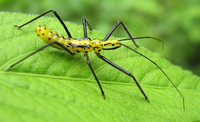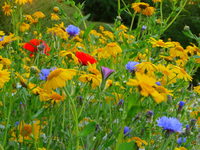Observe
Contents
Key Stage 1
Meaning
To observe is to watch and listen to something very carefully.
Examples

|

|

|
| A scientist observes the number of legs on an insect. | A scientist observed that a cat makes a "meow" sound. | A scientist made observations of the colour of different flowers. |
Key Stage 2
Meaning
To observe is to use our senses to study something very carefully or use a tool to measure something.
About Observing
- We might watch and listen and if it is safe then we might smell or even touch something to observe it.
- We might also use a ruler to measure the length of something or a stopwatch to measure how long it takes for something to happen.
Examples
- A scientist uses a stopwatch to see how long it takes for a kettle to boil.
- A scientist took one picture of a plant every day to see how it grows.
- A scientist touched a window, a brick and some carpet to find out which one had the roughest texture.
Used in a Sentence
- A scientist to observes how long it takes a kettle to boil one cup of water.
- A scientist observed the growth of a plant by taking a picture every day.
- A scientist wrote down observations of the texture of different surfaces.
Key Stage 3
Meaning
To observe is to collect information during an experiment using our senses and measuring tools and record that information.
About Observations
- Observations may be informal (not part of an experiment) and can be used to make a hypothesis which then leads to an experiment.
- Some observations are made during an experiment because the dependent variable cannot be measured. This might happen if there is a colour change of an indicator or a precipitate is formed. In both cases these are not measured but observed.
Key Stage 4
Meaning
To observe is to collect and record information during an experiment using scientific tools and instruments. Any data collected during an experiment is called an 'observation'.
About Observations
- Observations may be informal (not part of an experiment) and can be used to make a hypothesis which then leads to an experiment.
- Some observations are made during an experiment because the dependent variable cannot be measured. This might happen if there is a colour change of an indicator or a precipitate is formed. In both cases these are not measured but observed.
Key Stage 5
Meaning
To observe is to collect and record information during an experiment using scientific tools and instruments ideally in a way that does not affect the experiment. In some experiments observing is not a passive activity and the act of observing changes the results of the experiment.